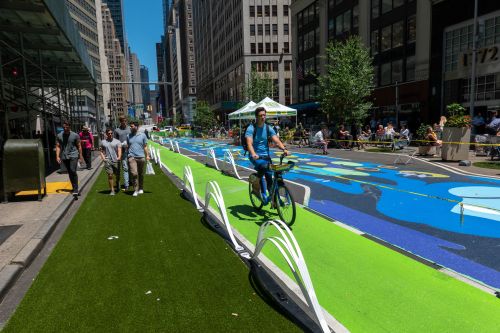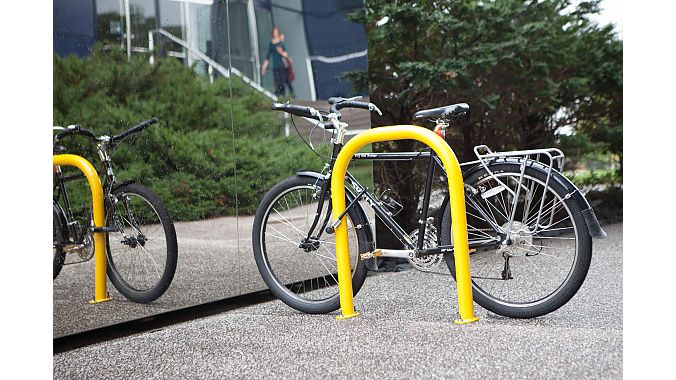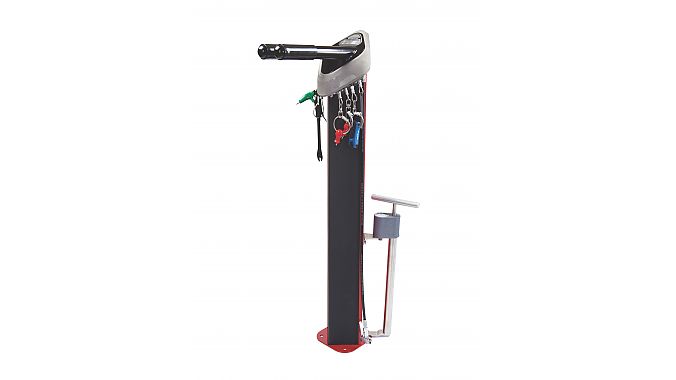A version of this story ran in the December issue of BRAIN.
MADISON, Wis. (BRAIN) — At the PeopleForBikes Shift '23 conference in Arkansas, Rep. Earl Blumenauer spoke enthusiastically about bike partisanship and how a collective effort between cycling advocates and Congress could reduce the growing vehicle parking sprawl.
"In this country, we have two billion parking spaces," said the Democrat from Oregon, who announced a couple weeks after the October conference that he will not seek reelection next year. "And as you know, free parking is not free. It's an area the size of Connecticut. If we're able to deal with bike partisanship, we can dramatically reduce that footprint of parking. There'll be more places for people to live, and it's going to be less of a challenge to get from the door to the desk."
Saris Infrastructure was and has been listening to thoughts like these.
Since beginning manufacturing bike products in 2000 — when the business was called Saris Parking — Saris Infrastructure has sold more than one million bike parking solutions. It is currently working with Washington, D.C., to reimagine the city's infrastructure, providing nearly 2,000 bike docks so far, with more to come.
"Given the average parking-space size, you can comfortably fit 12 peoples' worth of cycling parking in that same space," said Chris Bauch, Saris Infrastructure general manager. "If more people elected to ride instead of drive, we could reduce our parking footprint, and in a world with finite space, lending more resources to parking bikes instead of cars just makes sense."
Mayor reimagines city's infrastructure
According to Saris, D.C. Mayor Muriel Bowser has made cycling a focus of her transportation policies since being elected in 2015. Following re-election in 2018, the D.C. Department of Transportation began working to fulfill her plan and began securing bike racks. Saris then reached out to enter the bidding process. Saris was chosen based on competitive pricing and performance, Bauch said.
"We are thrilled to have been selected to work with D.C. and help them reach our shared mission of increasing cycling accessibility for all," he said.
A D.C. Department of Transportation spokesperson declined to comment, explaining that department policy is to not provide comment to promote a specific brand.
Saris provides bike parking products — including outdoor and indoor docks and racks — public workstands and tire pumps, and mobility infrastructure — including stair access ramps and delineators for temporary pop-up bike lanes. The majority of the products are made in the U.S. and all are assembled at the company's Madison facility, Bauch said. In 2016, Bike Fixation and Saris Parking merged and five years later all in-house manufacturing was moved to Madison after previously being split between there and Minneapolis.
Investing in Saris Infrastructure team
In June 2022, Saris restructured under a Wisconsin state statute similar to the federal Chapter 11 bankruptcy. Longtime owners Chris and Sara Fortune left the company, which was then sold to C+A Global. Saris continues to have three main businesses: car racks, indoor trainers, and infrastructure.
Bauch said that under the new owners, product lead times have been reduced, adding, "The biggest change has been a greater investment in our infrastructure team's growth and success."
Specifically for D.C. Saris has been providing its bike docks in the form of on- and off-street rail-mounted corrals since 2019. More docks are expected to be in place by the spring.
"A natural part of this business involves working directly with government businesses," Bauch said. "However, we also work on a smaller scale, within cities with building managers, schools, and others to assess their needs and develop solutions. Our work has brought us to communities all over the country, and we're thrilled to continue to build our relationships with D.C. and beyond."
D.C. experienced a "significant increase" of bike trips last year, going from 49th to 35th in the nation, according to Saris, quoting StreetLight data.
Bauch said meeting a city's bike infrastructure goal often requires unique solutions with major cities and metro areas often having a bike plan already in place. "That being said, we also encounter planners seeking our expertise before they develop formal plans," Bauch said. "Needless to say, it is never a one-size-fits-all conversation, and consultation varies based on existing plans, budget, and project size."
E-bike charging solutions
Cities seeking e-bike charging stations are becoming more common, and Saris responded by testing its pilot charging station in 2019 and 2020 and launched it this year. It utilizes UL-certified components and has a cooling system to prevent the charger from overheating, Bauch said.
"It was an incredibly exciting product for us to launch and needed in a growing market to ensure the safety of both the actual bikes and bike owners," Bauch said. "We've been in touch with architecture firms who specifically add these charging stations to new building construction and are excited to see it take off in the coming years as e-bikes continue to rise in popularity."






